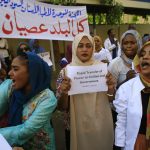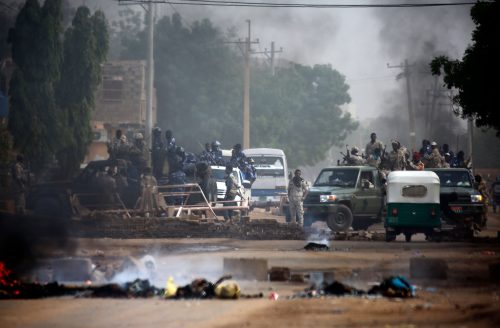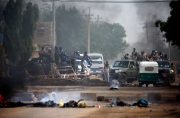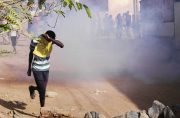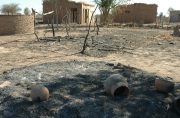PHR’s March 2020 report “‘Chaos and Fire’: An Analysis of Sudan’s June 3, 2019 Khartoum Massacre” exposes targeted attacks on health care providers and sexual and gender-based violence against pro-democracy forces.
PHR’s investigation into the violations that occurred on June 3, 2019 focused on: the nature of the injuries and other physical trauma resulting from events on June 3, 2019 in Sudan; patterns in the testimonies of interviewees and medical evidence to assess allegations of a systematic, widespread, and premeditated campaign of human rights violations by Sudanese security forces; and to what extent, if at all, security forces targeted health workers for detention and ill-treatment due to their emergency medical response and other efforts to support the provision of medical care for injured pro-democracy protesters.
The violent suppression of protests which led to the ouster of Sudanese President Omar al-Bashir beginning in April 2019 shone a spotlight on the ruthless tactics of his government in suppressing dissent.
PHR’s report “Intimidation and Persecution: Sudan’s Attacks on Peaceful Protesters and Physicians” showed how security forces particularly targeted medical professionals who helped organize and lead the protests, but also who simply carried out their professional duty to care for all without discrimination. Read our fact sheet here.
President al-Bashir’s removal also brought renewed attention to his role in the ongoing war in the Sudanese region of Darfur, which has killed hundreds of thousands of people and displaced millions since early 2003. Darfuris have fled homesteads that belonged to their families for generations. The massive assault by the government of Sudan and its ruthless proxy militias, the Janjaweed, on the non-Arab Darfurian population, has included widespread killings and rape, and the sweeping destruction of homes, community structures, wells, crops, livestock, and personal assets.
In 2009 and 2010, President al-Bashir was indicted by the International Criminal Court (ICC) for war crimes, crimes against humanity, and genocide for directing mass killings, rape, and the plundering and pillaging of civilian villages.
PHR began investigating the assault on Darfur in 2004, collecting eyewitness testimony from dozens of Darfurian refugees in neighboring Chad. We found that by eliminating access to food, water, and medicine, expelling people into inhospitable terrain and then, in many cases, blocking crucial outside assistance, the government and the Janjaweed created conditions calculated to destroy the non-Arab people of Darfur.
We called the actions genocide. Our findings were published in the report “Darfur: Assault on Survival.”
Another PHR report, “The Use of Rape as a Weapon of War in the Conflict in Darfur, Sudan,” documents a campaign of rape by the Janjaweed militias in concert with the government of Sudan. Our work in 2009, in partnership with the Harvard Humanitarian Initiative, culminated in another exposé entitled: “Nowhere to Turn: Failure to Protect, Support and Assure Justice for Darfuri Women,” documenting the scope and long-term impact of rape and other sexual violence experienced by these women.
PHR’s work in the region spurred the Stop Mass Rape in Darfur and Chad campaign and the Darfur Survival Campaign, which mobilized health professionals, students, and members of the general public to press for urgently needed security in Darfur and for the prosecution of perpetrators by the ICC for the crime of genocide.
PHR was also a member of the Save Darfur Coalition, a group of more than 190 religious, political, and human rights organizations to raise awareness and mobilize a response to the atrocities in the region.

